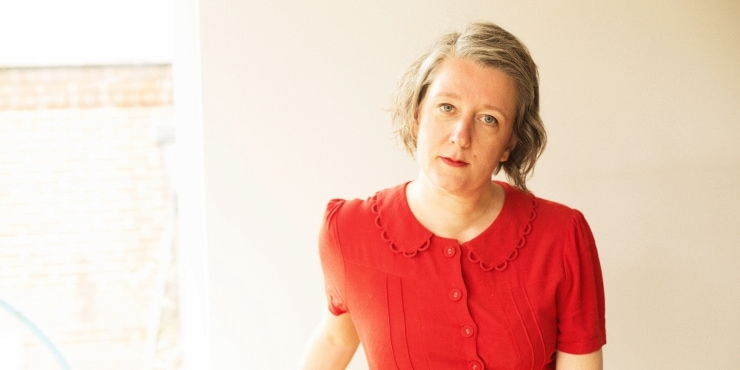Meet the Author: Claire Fuller
 Credit: Adrian Harvey
Credit: Adrian Harvey
Claire Fuller is an author who won the 2015 Desmond Elliott Prize for her debut novel Our Endless Numbered Days. She also won the BBC Opening Lines Short Story Competition in 2014 and the Royal Academy & Pin Drop Short Story Award in 2016. Her second novel, Swimming Lessons, was shortlisted for the 2018 Royal Society of Literature Encore Award. Bitter Orange, her third novel, was nominated for the International Dublin Literary Award.
Claire’s most recent novel, Unsettled Ground, published by Fig Tree in March was shortlisted for the 2021 Women's Prize for Fiction. You can find Claire’s books on our catalogue.
- I usually ask writers about literary influences but you came to writing from an arts background. How did you start writing as a career?
I didn’t start writing fiction until I was forty, although I’ve been a big reader for all of my life. I signed up for a ‘short story slam’ at my local library, where I had to write a short story and read it out to an audience. It was very scary, not only because it was my first ever short story but also because reading aloud to an audience was something I’d never done before. I carried on writing short stories and then I decided to do an MA in creative writing, and I wrote my first novel, Our Endless Numbered Days, on that course.
- What is your writing routine? What does a typical writing day look like?
I write full time now (I gave up the ‘day job’ halfway through writing my second novel), and I pretty much keep to office hours. Starting work at 9, and finishing about 6pm. If I’m writing the first draft of a novel I do a lot of procrastinating during that time, because I find first drafts really difficult. But if I’m editing and revising a novel, then I can do it for eight hours straight. I also try and do a small amount of writing on a Saturday and a Sunday because I find that it makes the writing on Monday better.
- Can you give us a flavour of Unsettled Ground and how it came together? How did the characters of Jeanie and Julius develop? Did your written drafts change much from the first to the last?
Unsettled Ground is about Jeanie and Julius, 51 year old twins who still live with their mother in rural isolation and poverty. When she dies, they have to learn to cope with the outside world. The inspiration for it came when I found a derelict and vandalised caravan in some woods near to where I live. It was a very atmospheric place and it made me start thinking about who would have lived there, and how, and why. Jeanie came first as a character, and I discovered more about who she was as I wrote.
I don’t plan my novels, they grow as I write. And they do change as I go along, but it’s hard to see that change because it happens daily in a kind of rolling way, in that I’ll edit a little and write a new section, think a bit, go back and change something, edit some more, write some more new words. All this takes about a year and a half until the draft is finished. But it’s not really a first draft – it’s maybe a 100th draft.
- Living in a rural part of the world your book made me think about those people who do not enjoy our advantages of being able to read and being connected to the Internet. How did you begin researching that situation?
I research as I go along, so I didn’t research these elements until I was a little way into writing the book and realised the situation Jeanie, especially, finds herself in, without being able to read or write and without access to technology. I read many government papers and documents about the challenges those living in rural areas face: bus services decreasing, libraries closing, public telephone boxes changing into defibrillator boxes and so on. But these were pretty dry and it was a case of using my imagination and putting myself inside Jeanie’s life to see what it might be like for her.
It wouldn’t have been appropriate to find people in her situation and interview them, but I did speak to someone who had been a community nurse working with people living in a similar way to Jeanie, just to check that I was on the right lines.
- I've been reading your Flash Fiction section based on photographs on your website. Will you be publishing any short stories?
I still write a number of short stories each year and sometimes enter them into competitions or put them on my website. One day maybe I’ll see if I can get a collection together.
- Is there anything you can share with us about your latest project?
I’m reaching the end of the first draft (or 100th) of a novel and it seems to be about captivity, octopuses, medicine, Greece, and viruses.
- One book that everyone should read?
Oh, so many books everyone should read. But I’m going to go with Train Dreams by Denis Johnson. A mighty novella.
- What is on your 'to read' pile at the moment?
Again, so many books! I’m working my way through Edward St. Aubyn’s Patrick Melrose novels alongside a couple of bookish friends on Instagram. I’m just about to dive into Some Hope. These books cover difficult subjects, but with such great writing.
- Can you tell us one thing about yourself that your readers may not know?
I like to eat my poached eggs on toast by removing all the white first and eating it with the crusts. And then I eat the yolk spread on the middle of the toast. It’s the only way.
